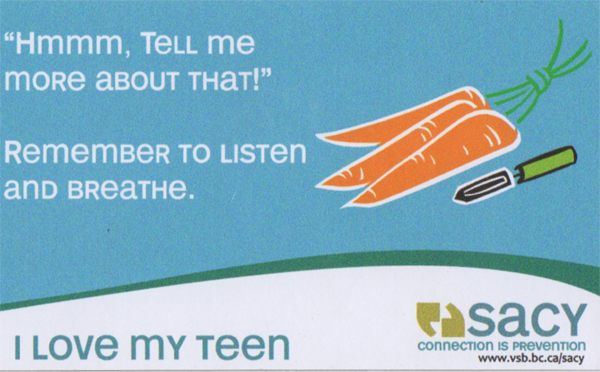
Adolescence is a period of very strong feelings and high stress[1]. It is a time when youth are managing academic pressures, parental expectations, the demands of friends and their own confusing process of self discovery. A critical strategy to strengthening relationships with adolescents is for adults to manage their own emotions while teens navigate ways to express themselves. Sometimes teens can burst into a room or a conversation, with ferocious intensity and drama.
Comments may be hurled out such as;
“I hate math! That’s it, I’m dropping it!”
“I’m so happy! I’m going to [a name you’ve never heard of] family’s cabin for the whole weekend!”
Here are seven steps for parents to help manage emotions mindfully[2] instead of adding fuel to the fire.
Step one: Take a deep breath in… and then exhale.
Step two: Consciously relax your shoulders.
Step three: Imagine stepping back in your mind. Not away from your teen, but stepping back from your own internal, emotional reaction. Distance yourself from the unsaid words of, “Oh no you’re not!”
Step four: Instead, with mild interest and slight distraction, say, “uh huh?”
Step five: This can be hard, but now remain quiet and only add, “tell me more” if silence falls.
Step six: Name the emotion you see in your teen rather than focusing on the content or words of their message. This might sound like, “You seem really fed up!” or “Wow, it sounds like you are really happy! Tell me about this friend.”
Step seven: Just listen, say “uh huh” or “tell me more” and listen some more. Trust that there will be time later—in 2 hours or in 2 days—to ask how they’re feeling about math or to find out who this friend is. Later, when the intensity of the initial emotions has subsided, a conversation can be had with a lower risk of defensiveness and negative reactions (both for your teen and for yourself).
Also see:
In a study looking at the daily emotional experiences of youth, results indicate that the early teen years tend to be emotionally inconsistent with stability finally increasing in late adolescence.
Mindfulness is the practice of focusing one’s attention on the present-moment in an open and accepting way.
The results of a study across 65 families showed that teaching mindfulness practices enhanced parent-adolescent relationships positively by reducing relationship stress.
Visit the SACY site for more information and inspiration to build connections between parents and youth.